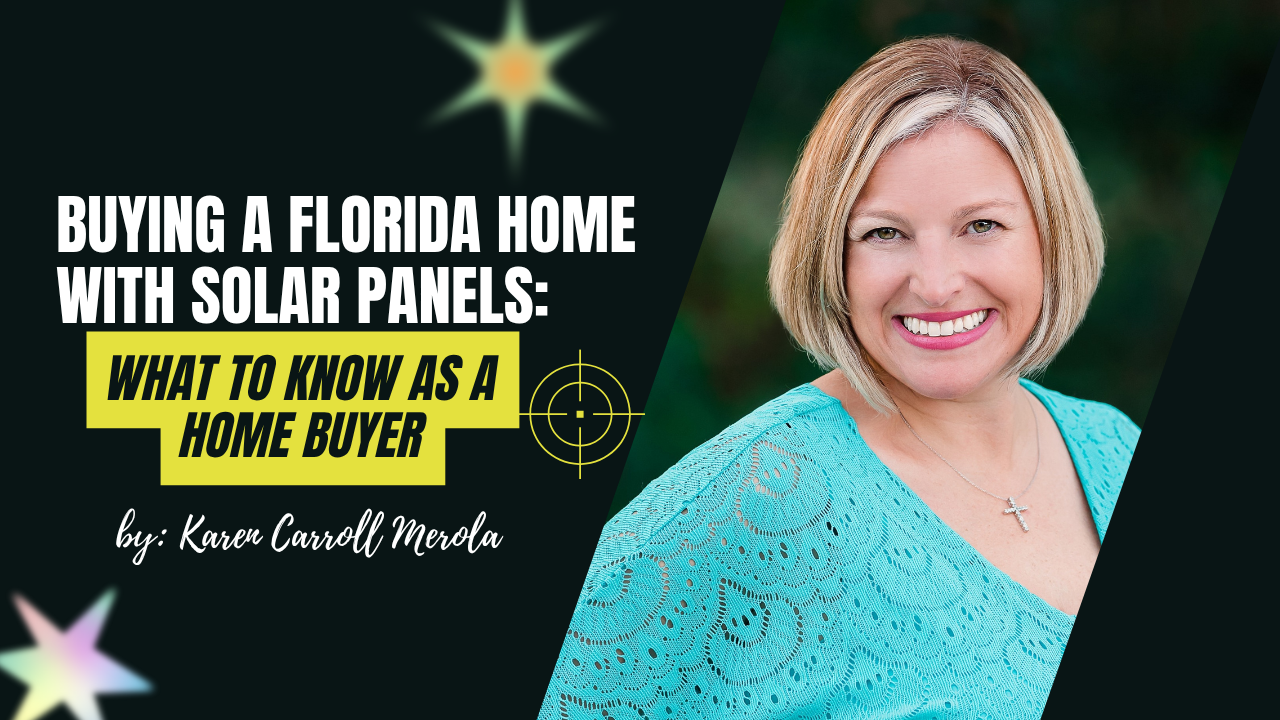Categories
Real Estate, Solar Panels, Bonita Springs,Fl, Estero,FlPublished November 12, 2025
Buying a Florida Home with Solar Panels: What to Know as a Home Buyer

Buying a Home with Solar Panels in Florida:
What You Need to Know
How Home Solar Systems Work
Home solar systems—also known as solar photovoltaic (PV) systems—convert sunlight into electricity to power your home. Roof-mounted solar panels contain photovoltaic cells that produce direct current (DC) electricity when exposed to sunlight. This DC power then flows to an inverter, which converts it into alternating current (AC) electricity—the kind used by household appliances.
The energy generated can be used right away, stored in a battery system, or sent back to the electric grid. Most Florida homes have grid-tied solar systems, meaning they remain connected to the local utility. At night or during cloudy weather, you still have access to grid power. When your system produces more electricity than you need, the surplus flows through a bi-directional meter back to the grid, often earning credits under Florida’s net metering program. These credits offset your electricity costs when your panels produce less power.
Grid-Tied Systems and Power Outages
In a typical grid-tied setup, solar panels automatically shut off during power outages for safety reasons. This prevents electricity from flowing into power lines while utility crews are working. As a result, standard solar panels alone won’t power your home during a blackout—unless you have battery storage or a hybrid inverter system.
This is especially important for Florida homeowners to understand: during hurricane-related outages, solar panels without batteries won’t keep the lights on. Many homeowners choose to add a battery backup or generator to ensure continued operation during storms.
Built for Florida’s Weather
Florida’s sunshine makes solar technology particularly effective, and systems here are engineered to handle the state’s challenging conditions. Professionally installed solar arrays are designed to withstand hurricane-force winds, typically rated for 150–160 mph gusts (equivalent to a strong Category 4 hurricane).
Modern solar panels also feature impact-resistant tempered glass and weather-sealed frames for long-term durability. Before buying a solar-equipped home, confirm that the installation was permitted and completed by a licensed contractor—this ensures it meets Florida’s building codes and safety standards.
Pros and Cons of Residential Solar Panels
Installing solar panels brings many advantages but also requires thoughtful consideration, especially in Florida’s real estate and climate context.
Pros
1. Lower Electricity Bills
A properly sized solar system can significantly reduce your monthly electric costs. Florida’s net metering allows homeowners to earn full retail credit for excess power sent to the grid. Over time, this can bring your net annual electricity cost close to zero.
2. Protection from Rising Energy Rates
Solar energy provides a hedge against utility rate increases. Each kilowatt-hour you produce is one you don’t buy from the grid, creating long-term stability.
3. Increased Home Value (When Owned)
Owned solar systems are viewed as valuable upgrades, often increasing resale value by 4–7%. Florida’s property tax exemption means that added solar value doesn’t raise your taxes.
4. Clean, Renewable Energy
Solar panels generate clean, renewable power and reduce reliance on fossil fuels—an environmentally friendly choice that fits Florida’s “Sunshine State” identity.
5. Backup Power with Batteries
Adding a battery storage system allows you to power key appliances during outages, offering peace of mind during hurricane season.
6. Low Maintenance
Solar panels have no moving parts and require little upkeep. Most systems carry 25-year performance warranties and 10+ years on inverters, plus online performance monitoring.
7. Florida Incentives and Savings
Florida offers:
- 100% property tax exemption on solar improvements
- Sales tax exemption on solar equipment
- Full retail net metering for major utilities
- The 30% federal solar tax credit for purchased systems
Florida-Specific Solar Considerations for Home Buyers
Florida’s legal and utility landscape includes unique rules and protections that make the state particularly friendly to residential solar. If you’re buying a solar-equipped home in Florida, here’s what to keep in mind.
Solar Rights and HOA Rules
Florida’s Solar Rights Act (Florida Statute 163.04) protects homeowners’ right to install and use solar energy systems. Homeowners associations (HOAs) cannot ban solar installations or force you to remove existing panels.
They may request reasonable adjustments—like rear roof placement—only if it doesn’t significantly reduce performance. They also can’t require panel colors, fencing, or landscaping that blocks sunlight.
This means if you’re buying in a community with an HOA, you’re protected under state law. You’ll still follow standard architectural review steps, but the HOA cannot deny your right to keep or install solar panels.
Net Metering and Utility Policies
Florida currently has favorable net metering laws requiring major utilities (like FPL, Duke, and TECO) to credit homeowners at full retail rates for excess solar generation.
In 2022, a bill proposed reducing those credits but was vetoed, keeping full net metering intact. As of 2025, buyers can still expect one-for-one credits for exported power.
Smaller utilities (like Jacksonville’s JEA or Gainesville’s GRU) may use modified net metering with lower credit rates, so it’s wise to check your local utility’s policy. Typically, new buyers inherit the previous owner’s agreement, so transferring the utility account ensures continuity.
Also note: some utilities have minimum monthly bills (e.g., $25) regardless of solar credits. These details appear on prior bills and can be factored into your budget.
State Incentives and Rebates
Florida’s biggest incentives include:
- Property tax exemption: Solar value isn’t added to your taxable home value.
- Sales tax exemption: New solar and battery equipment is exempt from Florida’s 6% sales tax.
- Local rebates: Some municipal or cooperative utilities occasionally offer limited rebates for solar or storage.





